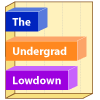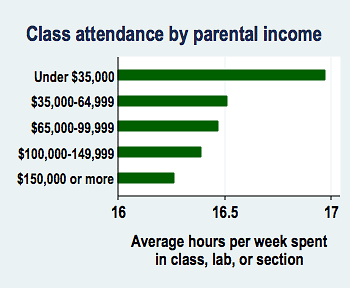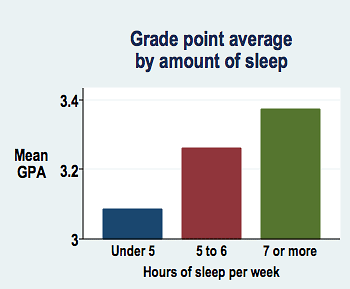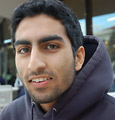UC Berkeley Press Release
 |
The undergrad lowdown
School and play: Students'
academic experiences and their use of time and
technology
BERKELEY — This five-part series paints a portrait of UC Berkeley students, based on the recently released findings of the 2007 University of California Undergraduate Experience Survey (UCUES) and several smaller surveys conducted by the campus's Office of Student Research.
 Five-part series: Five-part series: A 360-degree view of a student body • Roots
& Identity: Family background, keeping in touch with home,
campus personas • The
ABCs of UCUES: How the survey is conducted |
Today's installment highlights undergrads' academic experience and satisfaction, their educational goals, how they spend their time, and their technology ownership and use of social-networking services like Facebook.
Hitting the books
How do Berkeley undergrads choose their majors, spend their time, and size up the pros and cons of their academic and social experience at Cal? UCUES data on such questions both confirm and upset assumptions.
Take hours spent on schoolwork. Berkeley undergraduates report spending, on average, about 17 hours per week in classes, class sections, and labs. No surprise there, as that matches campus data on students' academic loads.
As for study time outside of class, these undergrads study an average of 16 hours a week. Faculty can be "a little floored" by this figure, says David Radwin of the Office of Student Research (OSR) — as "they typically expect students to spend at least two hours studying outside class for every in-class hour." (If it's any solace to Cal profs, he says, a gap between faculty expectations and students' actual studying time holds true across the UC system.) At Berkeley, hours devoted to studying is essentially the same regardless of students' year — though transfer students study about 10% more hours than students admitted as freshmen.

On a different measure of academic engagement — how much of the assigned reading students complete — 22% of freshmen complete more than 90% of their assigned course reading. Then, intriguingly, the figure drops off with each year in school: 15% of sophomores, 13% of juniors, and 11% of seniors. (For transfer students it's 18%.)
To the question "what factors were very important to you in deciding on your major?" 75% of juniors and seniors with declared majors cite intellectual curiosity. The second most common reason (for 48%) is to prepare for a fulfilling career. Money ranks third, with 22% reporting that prospects of securing a high-paying job was a very important factor in their decision. Far fewer chose a major based on their parents' wishes or on easy requirements for the major (7% each). Only 4% say they could not get into their preferred major.As it happens, immigrant status also has a strong bearing on students' choice of major. Some crunching of the UCUES data shows, for instance, that first- and second-generation immigrants are a lot more likely to major in science, technology, engineering, or mathematics than their peers. Why? OSR analysts have a couple of guesses. One is that mastery of English is not as crucial in these fields as it would be, say, in the humanities or the social sciences. "If you're in math and you don't have perfect English, it's not going to be much of a loss," notes Radwin. The prospect of well-paying jobs in science, medicine, and engineering may also be particularly attractive to more recent immigrants, he speculates.
'Disadvantage' and academic engagement 'We might expect that students from higher income, suburban, college-educated families would be more academically engaged than first-generation, immigrant and working-class students, who are often stereotyped as 'culturally disadvantaged,' less 'prepared,' or less easily integrated in the world of the selective undergraduate college. UCUES data told quite a different story…. Students from relatively disadvantaged backgrounds come out higher on every indicator of academic engagement, whether attitudinal or behavioral. — Report
on results of the systemwide 2006 UCUES,
issued by the Center for Studies in Higher
Education |
Grading Berkeley
On the whole, UC Berkeley undergrads report satisfaction with most aspects of their education. Eighty-nine percent say they're satisfied with the quality of instruction by faculty, 84% with teaching by their graduate-student teaching assistants. Students are more likely to give a thumbs-up to the quality of their upper-division (junior and senior-year) courses in their majors (90%), than they are to courses taken as freshmen and sophomores (74%). Most undergrads (84%) are satisfied with their ability to get into their chosen major and with the availability of courses they need for both breadth requirements (80%) and for graduation (81%).
Not surprisingly, students in majors with fewer students are more likely to be satisfied with their ability to enroll in small classes (68%) than students in the seven largest majors (58%) — business administration, economics, electrical engineering and computer science, English, molecular and cell biology, political science, and psychology. Undeclared students are in between, with 59% satisfied with their access to small classes.
Where the time goes
Just under half (47%) of undergraduates work during the school year, putting in 12 hours per week, on average. Eighty-three percent participate in some form of recreational sports or exercise, averaging 7 hours a week (while 18% reported spending zero time moving their bods.)
Though most students are raising their endorphin levels through exercise, almost half, nonetheless, could use more R&R. Close to 47% report that stress has interfered with their school work or academic success all the time or frequently; 43% say the same about sleep deprivation.
 "Intriguingly," says Radwin, "the
evidence from transcript records tentatively supports
the importance of sleep to academic performance." He
reports that, on average, the GPA of students who
usually sleep at least seven hours per weeknight
is 0.10 points (a tenth of a letter grade) higher
than students who sleep five to six hours. And it's
0.29 points higher (about the difference between
a B+ and a B) than students who slept less than five
hours.
"Intriguingly," says Radwin, "the
evidence from transcript records tentatively supports
the importance of sleep to academic performance." He
reports that, on average, the GPA of students who
usually sleep at least seven hours per weeknight
is 0.10 points (a tenth of a letter grade) higher
than students who sleep five to six hours. And it's
0.29 points higher (about the difference between
a B+ and a B) than students who slept less than five
hours.
Besides shut-eye and studies, how else do students spend their time? Predictably, socializing with friends ranks high: 38% of undergrads spend 11 or more hours per week with friends. Recreational computer use is even higher: 44% spend 11 hours or more a week on instant messaging, games, shopping, and other non-academic computer-based activities. Meanwhile, just 13% say they spend an equivalent amount of time on student clubs or organizations.
Does it compute?
What about all those hours spent on high-tech pastimes? What kinds of digital devices do students own and use? What kinds of websites do they visit? Is there a digital divide among students?
— Elliot Scales, junior |
— Rishi
Malhotra, sophomore |
In 2006 the Office of Student Research conducted a survey of Berkeley undergrads to get at these kinds of questions. Based on responses from 2,087 undergrads, it learned for starters that 99% own a computer. And compared to other colleges and universities, undergrads at Berkeley are substantially more likely to own a laptop (81%, vs. 56% nationwide, according to a survey of some 29,000 U.S. students conducted by the nonprofit association EDUCAUSE) — while they're less likely to own a desktop (41% of Berkeley undergrads, vs. 62% of their peers nationwide).
Does students' enthusiasm for all things digital translate to the classroom? Yes and no. Desire for more classroom technology is highest among freshmen (79% would like more lecture presentations via podcast or webcast, 64% vote for more use of PowerPoint), but decreases by year in school. Among seniors those percentages are 67% and 51% respectively.
Radwin speculates that that these differences "probably reflect some weariness of high-tech instruction delivery. For upper-division students "the novelty has worn off and students find these methods tiresome." Or maybe seniors "are simply more likely to take classes that use these technologies than freshmen, and therefore are more likely to be content with the status quo." Sounds like a future UCUES may need to sort this out.
Elsewhere on the technological front, the data conveys just how far we've come since the launch of the Princess telephone ("It's little… It's lovely… It lights") when Ike was in the White House: nearly all Berkeley undergrads (94%) own a cell phone, and 57% have a cell phone only (with no conventional land line in their place of residence). Just 3% have neither.
Facebook factoids
As reported in UCUES, a whopping four-fifths of Berkeley undergrads use Facebook, nearly half of them daily. First-year students rely most on the popular social networking site: 64% of freshmen report using it once or more a day (only 4% of freshmen say they never use Facebook). But it's downhill from there: 50% of sophomores use Facebook once a day or more, 46% of juniors, 40% of seniors. For transfer students, it's 26%.
One fourth-year Facebook dropout explained his decision this way: "I realized that it's stupid and that it's better to interact with people in person. Also, it came to my attention that people use it as a means to get information on people without asking, like a stalker. In my opinion, personal information should be personal and be known only to real friends."
Said another senior: "I realized that Facebook is the last thing I need to keep me in touch with people I care about. If you are strictly someone's Facebook friend, you are not their real friend."
Write-in responses concerning Facebook 'What is the best thing that has happened to you as a result of using Facebook?' • 'I met my future husband.' • 'I found my preschool best friend on Facebook. We lost contact after kindergarten, and she still remembers me!!' • 'I met a great friend on Facebook. Someone that is like me and understands the freshmen experiences. Has been very helpful in this transition.' 'What is the worst thing that has happened to use as a result of using Facebook?' • 'Had someone create a fake Facebook profile about me.' • 'Contacted by a creepy stalker-ish person via instant messenger. The person was asking inappropriate questions of a highly sexual nature.' • 'Such an effective tool for procrastination that I have turned papers in late because of spending so much time on Facebook.' |
Next: Unpacking 'diversity' — Student accounts of campus encounters with someone 'different' than themselves


